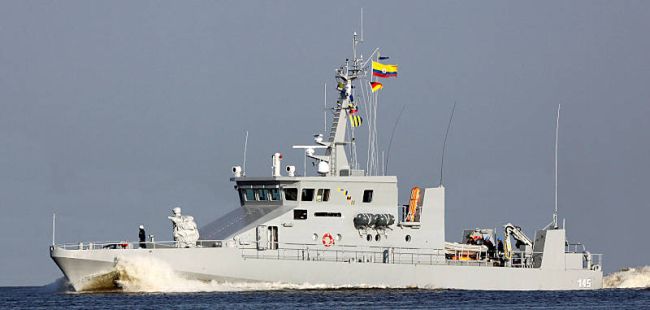Burma Still Nixes U.S. Military Help; China Accepts Aid, Admiral Says
By Gerry J. Gilmore
American Forces Press Service
WASHINGTON, May 28, 2008 — The Burmese government has yet to grant permission for U.S. military vessels to offload humanitarian supplies for its cyclone-stricken citizens, while the Chinese government has welcomed U.S. military-provided aid for its earthquake-stricken people, a senior U.S. military officer said here today.
Cyclone Nargis hit Burma on May 3, causing nearly 80,000 deaths and displacing hundreds of thousands. The United Nations has estimated that up to 2.5 million Burmese are in dire need of assistance, according to the U.S. Embassy in Bangkok, Thailand.
Burma’s ruling military committee, called a junta, has steadfastly refused to allow U.S. Navy ships to deliver tons of needed humanitarian supplies to Burmese ports or allow U.S. helicopters to fly in aid to devastated regions, Navy Adm. Timothy J. Keating, commander of U.S. Pacific Command, told reporters at a Pentagon news conference.
On May 12, the Burmese government began allowing U.S. military cargo aircraft to fly in humanitarian aid from Thailand to the Burmese airport in Rangoon. Since then, U.S. planes laden with food, water, blankets, mosquito netting and plastic sheeting have averaged about five flights into Rangoon each day, Keating noted. In this way, he said, about 1.4 million pounds of relief supplies have been delivered to Burma to date.
Current U.S. military flights to Rangoon are carrying goods provided by various nongovernmental aid organizations, Keating said, such as the United Nations, the World Food Program and other agencies.
“It doesn’t matter to us whose stuff it is we are moving,” Keating emphasized, noting the goal is to provide humanitarian aid to Burmese cyclone victims.
Upon reaching Rangoon, Keating explained, the U.S. military-transported relief goods are subsequently being distributed to the Burmese population by nongovernmental organizations and the Burmese government.
Marine Lt. Gen. John F. Goodman, commander of U.S. Marine forces in the Pacific region, remains in Thailand in charge of Task Force Operation Caring Response for Burma, Keating said.
Keating recalled his May 12 flight to Rangoon from Thailand aboard a U.S. Air Force C‑130 transport plane, accompanied by U.S. State Department officials.
“I reassured the Burmese delegation of a couple of points,” Keating recalled. “One, we were ready to provide relief assistance immediately. Two, we were capable of moving 250,000 pounds or so a day of relief material into Burma.”
Keating also informed Burmese officials that U.S. military helicopters could move humanitarian supplies inland from Rangoon to hard-hit places like the Irrawaddy delta region.
“We would come in and be entirely self-sufficient,” Keating said he told Burmese officials. The U.S. troops, the admiral added, would also depart Burma “every evening” if its government desired that.
Burmese officials were invited to ride aboard the U.S. helicopters as they delivered aid, Keating recalled. The Burmese officials also were urged to visit the U.S. flotilla that’s laden with supplies and waits off the Burmese coast.
The Burmese officials in Rangoon responded that they couldn’t grant the necessary permission and the question would have to be taken up with higher authorities, Keating recalled.
“We went to great lengths to try to assure them and reassure them that we had no military intentions” in Burma, Keating said. “We wanted to provide relief, and we were capable of doing that already.”
Meanwhile, the USS Essex, USS Harpers Ferry, USS Mustin and USS Juneau still remain in the Bay of Bengal, about 50 nautical miles off Burma’s coast, awaiting permission from the Burmese government to deliver humanitarian supplies.
The U.S. servicemembers in the naval flotilla “badly, desperately want to help” the Burmese people, Keating emphasized. But the U.S. Navy ships, he predicted, would not be posted off Burma indefinitely.
In contrast to the Burmese government, the Chinese government has readily accepted U.S. military-provided humanitarian aid for earthquake victims, Keating pointed out.
The People’s Republic of China’s Sichuan province was hit by a magnitude 7.9 earthquake on May 12 that’s estimated to have killed more than 30,000 people.
Last weekend, the U.S. military dispatched two C‑17 cargo jets to China laden with tens of thousands of pounds of relief supplies including generators, food, tents, water, and water-purification equipment provided by the Federal Emergency Management Agency.
Around that time, Keating recalled receiving permission to use the U.S.-China military hot line to talk with a senior Chinese air force general. The Chinese general, he said, was aware of the arrival of the U.S.-provided aid.
Two more U.S. military airplanes recently arrived in China, Keating noted, one carrying members of a Los Angeles Fire Department urban rescue team and the other delivering tents.
“Principally, there are millions of folks who are without shelter, and so one of the things that the Chinese tell us they need is tents,” Keating explained.
The People’s Republic of China forwarded more than $5 million in aid to the United States for Hurricane Katrina relief in September 2005.
Source:
U.S. Department of Defense
Office of the Assistant Secretary of Defense (Public Affairs)

 von
von 